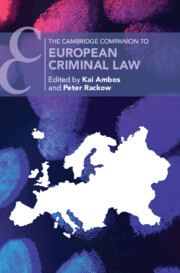Book contents
- The Cambridge Companion to European Criminal Law
- Cambridge Companions to Law
- The Cambridge Companion to European Criminal Law
- Copyright page
- Contents
- Notes on Contributors
- Preface
- Table of Cases
- Abbreviations
- Part I Foundations of European Criminal Law
- Part II Purposes and Principles
- Part III European Substantive Criminal Law
- Part IV European Criminal Procedure
- Part V Institutions
- Part VI Perspectives
- Bibliography
- Index
- References
Part IV - European Criminal Procedure
Published online by Cambridge University Press: 09 February 2023
- The Cambridge Companion to European Criminal Law
- Cambridge Companions to Law
- The Cambridge Companion to European Criminal Law
- Copyright page
- Contents
- Notes on Contributors
- Preface
- Table of Cases
- Abbreviations
- Part I Foundations of European Criminal Law
- Part II Purposes and Principles
- Part III European Substantive Criminal Law
- Part IV European Criminal Procedure
- Part V Institutions
- Part VI Perspectives
- Bibliography
- Index
- References
- Type
- Chapter
- Information
- The Cambridge Companion to European Criminal Law , pp. 229 - 326Publisher: Cambridge University PressPrint publication year: 2023



